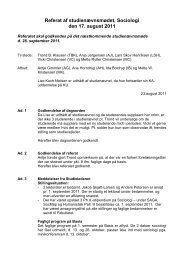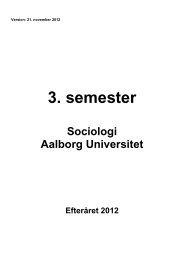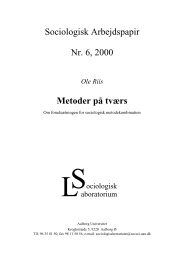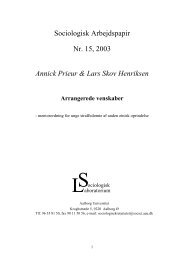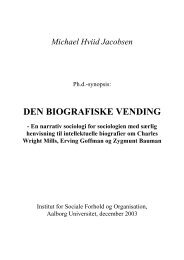Utopianism in the Work of Zygmunt Bauman - Sociologi - Aalborg ...
Utopianism in the Work of Zygmunt Bauman - Sociologi - Aalborg ...
Utopianism in the Work of Zygmunt Bauman - Sociologi - Aalborg ...
Create successful ePaper yourself
Turn your PDF publications into a flip-book with our unique Google optimized e-Paper software.
more encompass<strong>in</strong>g notion <strong>of</strong> utopia as part and parcel <strong>of</strong> <strong>the</strong> human predicament and condition.<br />
2 Central to Mannheim’s position is <strong>the</strong> separation <strong>of</strong> ‘utopia’ from ‘ideology’. Utopia transcends<br />
reality and breaks <strong>the</strong> bonds <strong>of</strong> <strong>the</strong> exist<strong>in</strong>g order through, at some po<strong>in</strong>t <strong>in</strong> time, be<strong>in</strong>g<br />
passed over <strong>in</strong>to actual conduct whereas ideologies are <strong>the</strong> situationally transcendent ideas<br />
that never succeed <strong>in</strong> a de facto realisation <strong>of</strong> <strong>the</strong> <strong>in</strong>tended and projected contents. Transcendence,<br />
however, constitutes <strong>the</strong> core <strong>of</strong> both types <strong>of</strong> th<strong>in</strong>k<strong>in</strong>g whe<strong>the</strong>r <strong>the</strong>y reach <strong>the</strong>ir po<strong>in</strong>t<br />
<strong>of</strong> orientation or not (cf. Mannheim 1936/1976:173ff, 184). This analytical dist<strong>in</strong>ction is, admittedly,<br />
at odds with <strong>the</strong> one advanced <strong>in</strong> this article where utopian ideas do not necessarily<br />
have to be transformed <strong>in</strong>to concrete action <strong>in</strong> order to be deemed utopian. Leonidas Donskis<br />
<strong>the</strong>refore also noted that “without ideology, utopianism becomes little more than <strong>the</strong> free play<br />
<strong>of</strong> imag<strong>in</strong>ation devoid <strong>of</strong> cultural – aes<strong>the</strong>tic, moral, and <strong>in</strong>tellectual – articulation” (Donskis<br />
2000:2). Utopia and ideology are, <strong>in</strong> o<strong>the</strong>r words, <strong>in</strong>extricable l<strong>in</strong>ked and <strong>in</strong> <strong>the</strong> work <strong>of</strong><br />
<strong>Bauman</strong> is more than merely a ‘free play <strong>of</strong> imag<strong>in</strong>ation’ – it is <strong>in</strong>stead dead serious. For a<br />
good and compressed discussion <strong>of</strong> ideology and utopia from <strong>the</strong> early liberalism and marxism<br />
onwards, see Chattopadhyaya (1997:67ff).<br />
3 As Jeffrey Alexander captures this po<strong>in</strong>t very well: “Utopian conceptions <strong>in</strong>form and complement<br />
<strong>the</strong> k<strong>in</strong>ds <strong>of</strong> differentiated and pluralistic social orders we <strong>in</strong>habit today. For utopias<br />
to be ‘real’, it is enough that various conceptions <strong>of</strong> utopia do, <strong>in</strong> fact, animate <strong>the</strong> nooks and<br />
crannies, <strong>the</strong> spheres and subsystems, <strong>of</strong> such a social order. The reality <strong>of</strong> utopia does not<br />
(empirically), cannot (<strong>the</strong>oretically), and <strong>in</strong>deed should not (normatively) depend on its actual,<br />
that is complete, realization” (Alexander 2001:581). Thus, for utopia to be real merely<br />
means that it should to some extent be thought <strong>of</strong> and be present <strong>in</strong> <strong>the</strong> back <strong>of</strong> <strong>the</strong> m<strong>in</strong>ds <strong>of</strong><br />
people – it does not have to be realised as a specific social order.<br />
4 Despite be<strong>in</strong>g relatively sceptical regard<strong>in</strong>g utopias and <strong>the</strong>ir tendency to be parad<strong>in</strong>g as<br />
potential totalitarian ideologies <strong>in</strong> disguise, Kolakowski is also capable <strong>of</strong> see<strong>in</strong>g <strong>the</strong> possibilities<br />
<strong>in</strong>herent <strong>in</strong> utopias for human purposes when he <strong>in</strong> <strong>the</strong> same connection cryptically<br />
remarked: “The existence <strong>of</strong> a utopia as a utopia is <strong>the</strong> necessary prerequisite for its eventually<br />
ceas<strong>in</strong>g to be a utopia” (Kolakowski 1969:92). Only by be<strong>in</strong>g presented by proponents<br />
and protagonists as utopia, as someth<strong>in</strong>g ultimately to be realised at a later stage <strong>of</strong> human<br />
development, will utopias cease to be utopian.<br />
5 This does far from mean that <strong>Bauman</strong> has shed himself <strong>of</strong> his socialist sympathies. In a recently<br />
conducted <strong>in</strong>terview he <strong>in</strong> eloquent fashion presents <strong>the</strong> follow<strong>in</strong>g diagnosis <strong>of</strong> socialism:<br />
“Like <strong>the</strong> phoenix, socialism is reborn from every pile <strong>of</strong> ashes left day <strong>in</strong>, day out, by<br />
burned-out human dreams and charred hopes. It will keep on be<strong>in</strong>g resurrected as long as<br />
<strong>the</strong> dreams are burnt and <strong>the</strong> hopes are charred, as long as human life rema<strong>in</strong>s short <strong>of</strong> <strong>the</strong><br />
dignity it deserves and <strong>the</strong> nobility it would be able, given a chance, to muster. And if it were<br />
<strong>the</strong> case, I hope I’d die a socialist” (<strong>Bauman</strong> & Tester 2001:155).<br />
6 In his first book published <strong>in</strong> English, Between Class and Elite, <strong>Bauman</strong> ends on a contemplative<br />
note when remark<strong>in</strong>g that “human history is notorious for its <strong>in</strong>sidious defiance <strong>of</strong><br />
probabilities” (<strong>Bauman</strong> 1972:322). History and its future developments cannot be calculated<br />
<strong>in</strong> advance.<br />
7 Despite his relentless critique <strong>of</strong> realism, <strong>Bauman</strong> does not want his utopianism merely to be<br />
dream<strong>in</strong>g. In this he could be associated with <strong>the</strong> so-called ‘Real Utopias Project’ <strong>in</strong>itiated by<br />
Erik Ol<strong>in</strong> Wright <strong>in</strong> which <strong>the</strong> desire accord<strong>in</strong>g to its programmatical statement is to propose<br />
“utopian ideals that are grounded <strong>in</strong> <strong>the</strong> real potentials <strong>of</strong> humanity, utopian dest<strong>in</strong>ations<br />
that have pragmatically accessible waystations, utopian designs <strong>of</strong> <strong>in</strong>stitutions that can <strong>in</strong>form<br />
our practical tasks <strong>of</strong> muddl<strong>in</strong>g through <strong>in</strong> a world <strong>of</strong> imperfect conditions for social<br />
56



